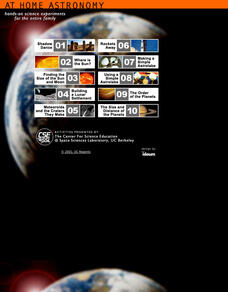California Academy of Science
Kinesthetic Astronomy: Birthday Stars
Space explorers take a virtual trip around the sun right within your classroom! They stand in a circle facing away from the "sun" (a lamp) in the center of the room. As they move according to your instructions, they view different...
BW Walch
Kelper's Second Law: How Do Planets Move?
Kepler's second law of planetary motion, specifically, the law of equal areas, is demonstrated by your high schoolers. On the provided graph paper, they mark out the designated path of Earth at two different times of the year and then...
California Academy of Science
Kinesthetic Astronomy: Mars Opposition Dance
Your class will watch as one child orbits the sun as Earth, while another orbits as Mars. If the timing is right, they will see the repetitive dance between the two planets and discover how often they are opposite from each other. For...
New Mexico State University
Lab 6: Kepler's Laws
A 15-page package thoroughly teaches your physics or astronomy learners about Kepler's three laws of planetary motion. Each one is stated and explained. Class members answer questions, solve problems, and participate in the classic...
Astronomical Society of the Pacific
Toilet Paper Solar System
Can we model how large the solar system really is? Attempt an astronomical feat with a hands-on-activity that uses a roll of toilet paper. Young scientists measure the distances of the planets from the sun to create a scale model of...
Lunar and Planetary Institute
Oreo Moon Phases
Learning about the moon has never tasted delicious! Using the popular Oreo cookie as a model, young scientists carve out the cream filling to represent the different phases of the moon.
NASA
Art and the Cosmic Connection
Solar art inspires! Scholars study planetary geology with an artistic analysis. Pupils view a PowerPoint presentation on the solar system and space exploration and then try their hand at planetary image analysis using art techniques.
Illustrative Mathematics
Solar Eclipse
Learners take on the role of astronomers, calculating conditions necessary for a total solar eclipse. Concepts of similar triangles and properties of circles come together as pupils create ratios and use real measurements in determining...
Texas Instruments
Texas Instruments: Multiple Choice Planetary Motion Study Cards
Kepler's Laws 1,2,3 including eccentricity of elliptical orbits. Good for reviewing planetary motions (NYS Earth Science).
University of California
At Home Astronomy: Hands on Science Experiments for the Entire Family
A collection of ten hands-on science experiments for the entire family that will help you understand concepts in astronomy. Make an astrolabe, find the size of the sun and moon, build a lunar settlement, find out about meteoroids, shadow...
Other
Lunar and Planetary Institute: Explore! Marvel Moon
A variety of hands-on activities designed to engage children in learning about the moon.
York University
Yes I Can! Science: Red Rover, Red Rover
The YES I Can! Science site based out of York University in Toronto is featuring the Mars rovers. The site has all the mission background information teachers need all in one place as well as several great student activities, (Build a...
Other
Lunar and Planetary Institute: Explore! Ice Worlds
Features a collection of hands-on activities, investigations, and explorations designed to engage students in learning about ice, both in the solar system and on planet Earth.
Other
Lunar and Planetary Institute: Make a Comet
Hands-on activity allows children to learn about comets by creating their own models using art supplies.
Bill Nye
Bill Nye: A Wing and Some Air
This tutorial by Bill Nye helps the learner to understand the concept of pressure. Using a simple paper U, learners can see the effects of low pressure, then learn what's happening on a molecular level.
Bill Nye
Bill Nye: Once in a Mega Moon
This tutorial from Bill Nye explains why the moon appears smaller when it's higher in the sky and presents an experiment that proves that it's all in your head.
National Geographic
National Geographic: Educator Resources: Extreme Weather on Other Planets
Find lesson plans, worksheets, photo galleries, and related links for teaching about the weather systems of planets in our solar system.











